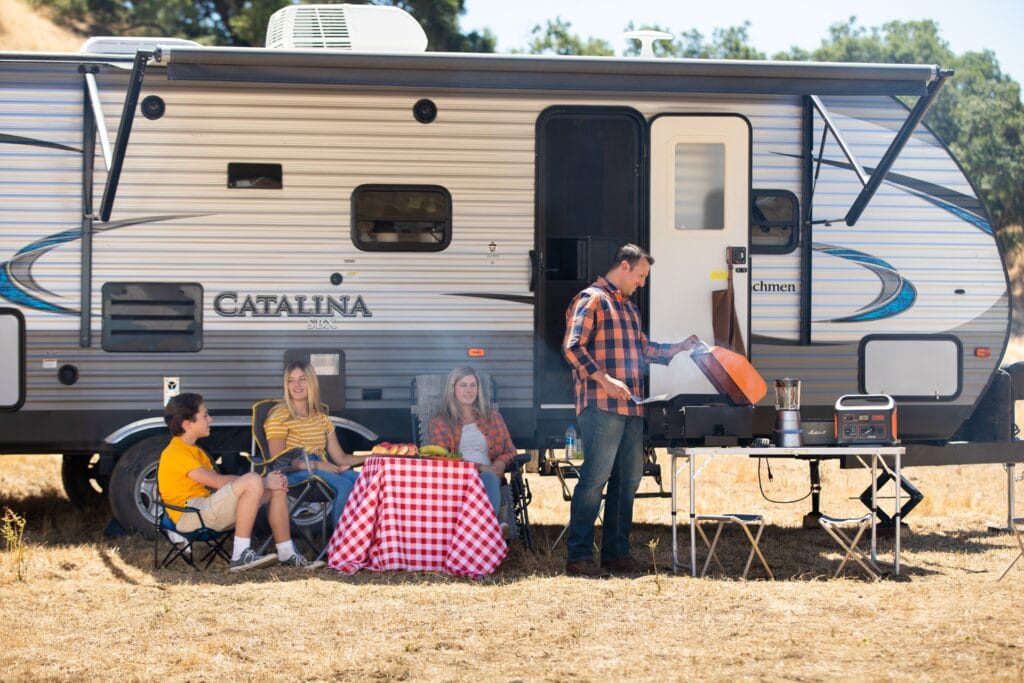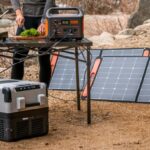A generator will be a lifesaver if you’re on a camping trip or your house has regular power outages.
When camping, many individuals mistakenly believe they do not need to ground their generator. However, you must always ground your generator when camping for a few crucial reasons.
You’ll discover some helpful intricacies about this topic, like how to ground portable generators. So keep reading to learn everything.
Does It Matter If You Ground Your Generator?
In most circumstances, grounding your generator is necessary for your campers’ safety. Grounding a generator may also reduce the danger of electrocution and destruction to the devices connected.
Some power generators have a metal frame that is already pre-grounded. Others may need to have a generator grounding rod installed in the ground. In light of this, you must consult the generator’s manual and grounding guidelines before beginning any such projects. If you plan and prepare enough, your camping generator may save the day while you’re in the wilderness.
If you’re camping and want to avoid lugging along a heavy gas burner, you can use this device to charge all your gadgets, illuminate your tent, or even cook a meal.
To operate it securely, however, it must be properly installed as an electric powerhouse. One such precaution is to make sure the generator is correctly grounded.
Why Is It Necessary to Practice Grounding?
Any electrical device may benefit from being grounded because it creates a route of least resistance for a stray current to dissipate into the earth safely. This bypass circuit keeps the fault current from touching any living beings or valuable equipment.
Most household electrical appliances use the standard 3-prong plug. Each of the three prongs is either a hot, neutral, or ground terminal.
For any current that has been accidentally routed via a short circuit, the third terminal, which is linked to the appliance’s body, is where it will end up. This GROUND terminal is linked to your house grounding wire, a rod or line buried at least 8 feet below your home’s foundation.
Is It Necessary to Install a Separate Ground Rod for Your Generator?
The owner’s handbook for your generator will provide the most helpful information on this topic. If it says to use a special ground rod, then you should. Use a grounding bolt to connect your generator to the earth when powering any item that requires a third prong. The specifications for the generator will vary from one manufacturer to the other. Review the manufacturer’s instructions and follow their advice for maximum protection.
Follow the local code in the absence of any specific instructions in the generator’s manual or in the absence of the handbook itself. Despite minor discrepancies across jurisdictions, they all address the essential requirements for generator safety.
When Using a Generator, How Do You Properly Ground It?
 You may ground your generator in a few different ways. In most cases, a GFCI (Ground Fault Circuit Interrupter) will do the trick (GFCI). This equipment connects the campground’s generator to the pedestal where electricity is distributed.
You may ground your generator in a few different ways. In most cases, a GFCI (Ground Fault Circuit Interrupter) will do the trick (GFCI). This equipment connects the campground’s generator to the pedestal where electricity is distributed.
The GFCI keeps an eye on the electricity in the circuit and shuts off the power if it senses a change. Consequently, humans and machinery are safeguarded from the harmful effects of electric shock.
The use of a ground wire is another option for ensuring proper grounding. You may use this to push a long metal rod into the earth. After that, a ground rod is set up, and a cable is strung from the generator to the ground rod.
Doing this allows electrical power to enter the earth without touching any living things or mechanical devices.
How to Ground My Generator
There is nothing complicated or sophisticated about grounding your camping generator. You won’t have to call in an expert electrician or handyman. You just need a few basic supplies, which you can purchase at your local hardware store or online at sites like Amazon.
Requirements
You’ll need a few things in addition to your generator to ground it properly.
- A copper rod, 4 feet in length to act like a conductive electrical wire
- Solid copper wire that complies with the NEC
- A mallet or hammer
- A wrench
Procedure
- A site with loose soil is ideal for burying the grounding rod.
- To ensure proper conductivity, do not keep the ground too wet or too dry. Soil with a little moisture content is ideal.
- Strike the grounding rod with a mallet, muck hammer, or wire stripper until it is at least three feet deep into the soil.
- Connect the solid copper wire to the ground rod with the camp and tighten the nut using the wrench.
- Join the other end of the cable to the grounding connector on the rear of your generator’s control panel; you’ll find this on most portable models.
- Ensure the end connections are snug and check all connections.
What Can You Expect When a Generator Isn’t Grounded?
You have to be careful when dealing with a piece of electrical equipment. There is a real risk that an ungrounded generator may quickly become a source of chaos and major issues. While you may assume what may happen with electricity involved, you may be wondering what those problems are exactly.
You should know by now that keeping your generator grounded is important. Several things may happen if a short circuit develops in an ungrounded generator:
- First, if a person touches the small appliance, they risk electrocution.
- Second, it poses a threat to your high-priced electrical gear.
- Third, as a result, you might damage or destroy your electrical system.
- Finally, a campfire or RV fire is a real possibility.
Because of this, you have to make sure to ground your generator. In addition, you should always ground your generator if you plan on running any large appliances, such as an electric kettle or heater.
Advice on Maintaining Your Portable Generator
 While on the road in an RV, you will only need a portable generator. After you go back to your house, you put the appliance away. Again, most of us miss this crucial point:
While on the road in an RV, you will only need a portable generator. After you go back to your house, you put the appliance away. Again, most of us miss this crucial point:
Instructions for the proper maintenance and storage of a portable generator.
Some of you may think that all you have to do is store the generator in a secure location out of the reach of children and away from moisture and dirt (for example, from falling, etc.). However, is that the case? Is it going to be sufficient to keep it secure?
Test your knowledge on how to store your portable generator safely in minutes.
Instances of a Power Generator
Please read the guidelines for proper storage. Read them thoroughly and comment on whether or not you plan to follow the advice given. You should keep the portable generator clean and cover it while not in use.
It’s easy for your portable generator to grow grimy if you leave it in a dusty garage or dark storage area for extended periods. You may count on finding a heavy coating of dust, dirt, or even mold/moss one day if you neglect to clean and wipe it.
Once these pollutants have built up, they may be able to infiltrate into critical appliance components, making it more difficult for the appliance to perform as intended. In addition, excessive dirt may damage your portable generator. Thus it’s important to clean it regularly.
Cleaning the Generator
Even if you use your portable generator sometimes (like at home), you still need to clean it once a month. The dirt and grime won’t wait until you’ve planned your summer RV vacation to start piling up.
Remember to keep it covered, too. To avoid soiling your portable generator, do as such. You may use a specialized generator cover, available at any major retailer, to safeguard your machine.
These coverings, by the way, often include features like water resistance or weatherproofing. They insulate. Therefore you should remove them before starting the generator to prevent it from overheating.
Drain the Fuel From Your Portable Generator After Usage
You must transfer the fuel from the generator’s tank to another container. We advise keeping enough gasoline in the tank for your generator but caution against leaving it unused. Gum buildup is possible otherwise.
Gum buildup might also hinder its functionality. For this reason, you should transfer the fuel from your portable generator to a different container after each usage.
Get Some Extra Gas and Filters, Just in Case
You should always have extra fuel when using a portable generator. All of us know that blackouts may last from a few hours to many days. Having a reliable supply of fuel for your generator is thus crucial.
Keep extra oil and filters on hand if your vehicle needs them.
Maintain a Close Eye on the Wattage of Your Portable Generator
Ensure your generator can handle the voltage you want to use before turning it on. You may find a portable generator’s wattage on the generator’s label or in the owner’s handbook since not all transportable generators are not equal.
You can find these ratings in pairs, with both “beginning” and “running” labels.
A generator’s beginning or maximum rating is the greatest watts it can produce for brief periods.
Conclusion
If you love to camp and carry a generator, you should be prepared and aware of how important grounding your portable generator is. And how to do it safely and effectively.
We discussed the significance of grounding generators and the potential consequences of neglecting to do so.
Every camper should take the extra safety measure of grounding their generator. This safeguards against shocks and protects both humans and machinery.
As a bonus, you now know some important maintenance procedures that will extend the life of your portable generator. You should know whether or not grounding your portable generator is necessary and how to do it safely and effectively. Alternatively, you may opt for a lithium battery that can be a good power source for small devices.





